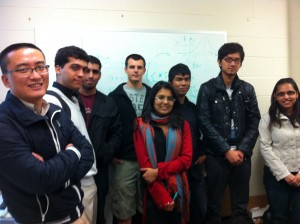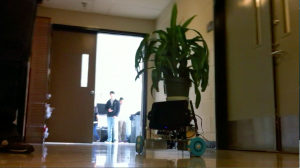IndaPlant Project, an Act of Trans Species Giving by Professor Elizabeth Demaray, Department of Fine Art, Rutgers, Camden and Dr. Qingze Zou, Department of Mechanical and Aerospace Engineering at Rutgars University, New Brunswick
The IndaPlant Project is an act of tran-species giving in which robotic platforms are engineered to support the free movement and metabolic function of ordinary houseplants. Now in the first year of a two-year production cycle, this initiative is dedicated to creating a community of light-sensing robotic vehicles, in which each vehicle is able to individually respond to the needs of a potted-plant by moving it around, in three dimensional-space, in search of sunlight and water.

Dr. Qingze Zou at left with the hard working IndaPlant team in the Department of Aerospace and Mechanical Engineering at Rutgers New Brunswick.
The initial IndaPlant unit currently performs basic sun-seeking, water-seeking, functions and is wired through an Arduino board. In addition to seeking light, this platform is chargeable via solar-power and performs basic motion planning so that it can indipendently avoid obstacles during movement.
IndaPlant is a collaborative effort between the Departments of Fine Art, Ecology & Evolution and Mechanical and Aerospace Engineering at Rutgers University. Initially conceived by the artist Elizabeth Demaray as an installation in a domestic environment, where a community of robotically supported houseplants could share information with one another or, conversely, compete for resources. Demaray states “my primary interest in creating this piece lies in the poetic implications of turning an immobile houseplant–which is completely dependent upon human largess and care–into a free agent which, depending upon either programming or emergent properties, could become a potentially cooperative or competitive entity.”
The emergent properties of a company of autonomous, light-seeking, potted-plants will be fascinating to both observe and program. Of particularly interest to the IndaPlant work group is the possibility of creating self-governing population of data sharers. In this scenario, the environmental data collected by one IndaPlant could be communicated between members of the population and used by the greater community for group decision-making purposes.
The IndaPlant group is delighted to report that the project will be exhibited as part of ISEA 2013 (the International Symposium on Electronic Art) conference in Sydney Australia, June 7th through the 16th, as part of the panel titled life, but not as we know it. https://www.isea2013.org/isea2013
